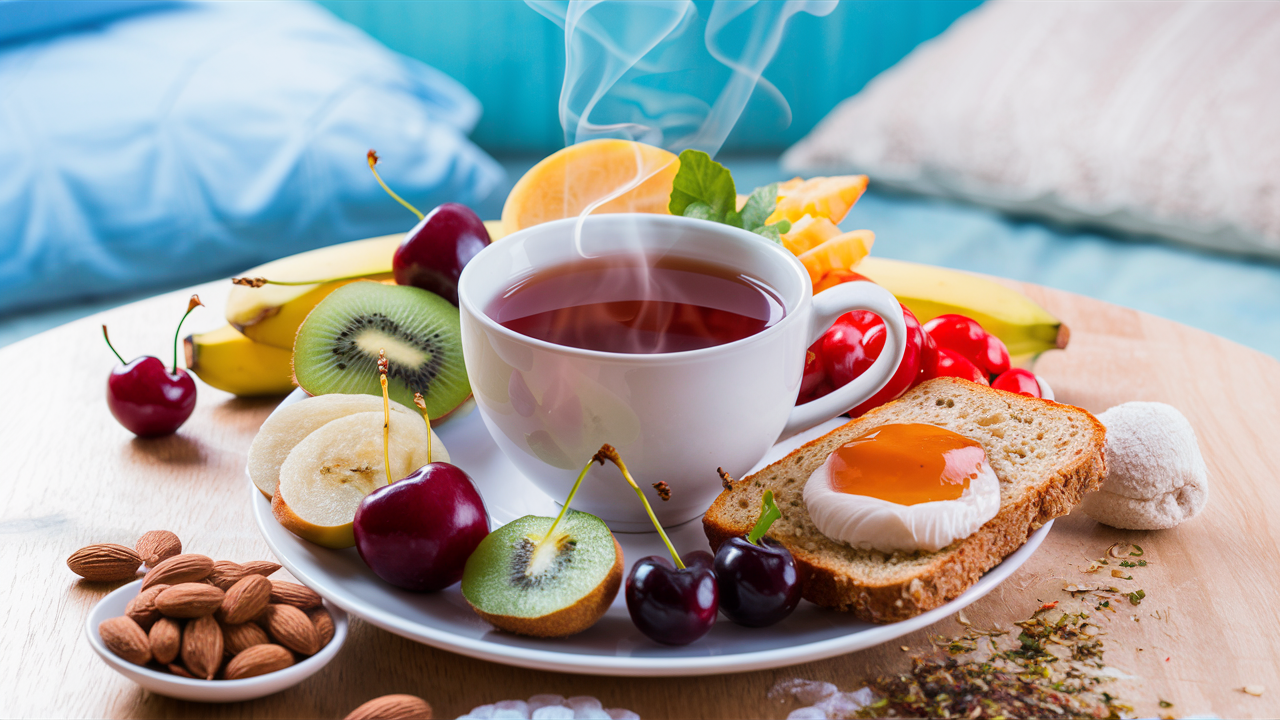
Table of Contents
Natural Sleep Tossing and turning all night? Millions of people worldwide struggle with sleep issues, impacting their productivity, mood, and overall well-being. While various factors can disrupt sleep, one often-overlooked area is diet. What you eat and drink can significantly influence your sleep quality. This blog post explores the fascinating connection between food and sleep, and equips you with a guide to natural sleep-promoting foods and drinks to lull you into a peaceful slumber.
Understanding the Sleep Cycle: The Science Behind a Good Natural Sleep Night’s Rest
Sleep is a complex physiological process vital for our physical and mental health. It’s during sleep that our bodies repair tissues, consolidate memories, and regulate hormones. There are four stages of sleep:
- Non-rapid eye movement (NREM) sleep: This stage has three progressively deeper levels. During NREM sleep, brain activity slows down, and muscle activity decreases.
- Rapid eye movement (REM) sleep: This is the stage where dreaming occurs. Brain activity is high during REM sleep, while muscle activity is almost paralyzed.
A healthy sleep cycle involves transitioning smoothly between these stages throughout the night.
The Food-Sleep Connection: How Diet Impacts Your Slumber
The foods and drinks you consume can significantly impact your sleep quality in several ways:
- Blood Sugar Levels: Spikes and crashes in blood sugar levels can disrupt sleep. Refined carbohydrates and sugary foods can cause these fluctuations, leading to restless sleep and wakefulness.
- Neurotransmitter Production: Certain neurotransmitters, like melatonin and serotonin, play a key role in sleep regulation. Some foods can influence the production of these neurotransmitters, impacting sleep quality.
- Digestive Issues: Spicy, fatty, or acidic foods can cause heartburn or indigestion, making it difficult to fall asleep or stay asleep comfortably.
- Stimulants: Caffeine and alcohol can interfere with sleep. While caffeine might provide a temporary jolt, it can disrupt sleep later in the night. Alcohol may initially induce drowsiness, but it fragments sleep and reduces REM sleep quality.
Natural Sleep Aids: Foods and Drinks to Promote Restful Sleep
Fortunately, nature provides an array of delicious and sleep-promoting foods and drinks. Here are some to incorporate into your routine:
- Tart Cherry Juice: Tart cherries are a natural source of melatonin, a hormone that helps regulate sleep-wake cycles. Studies suggest that tart cherry juice consumption can improve sleep quality and duration.
- Warm Milk: A warm glass of milk before bed is a time-tested sleep remedy. Milk contains tryptophan, an amino acid converted into serotonin, a neurotransmitter that promotes relaxation and sleepiness.
- Kiwi Fruit: Kiwis are rich in vitamins and antioxidants, including vitamin C, which can promote sleep quality. Additionally, kiwis contain folate, which may help regulate sleep patterns.
- Almonds: These heart-healthy nuts are a good source of magnesium, a mineral that helps relax muscles and can promote better sleep.
- Chamomile Tea: This herbal tea has been used for centuries to promote relaxation and ease anxiety. Chamomile tea may also have mild sedative properties, promoting sleepiness.
- Bananas: Bananas contain tryptophan, magnesium, and potassium, all of which contribute to relaxation and sleep quality.
- Fatty Fish: Fatty fish like salmon, mackerel, and tuna are rich in omega-3 fatty acids. Studies suggest that omega-3s may improve sleep quality and reduce symptoms of insomnia.
- Oatmeal: Warm oatmeal is a comforting and sleep-promoting snack. Oats contain complex carbohydrates that release glucose slowly, stabilizing blood sugar levels and promoting relaxation.
- Dark Leafy Greens: Vegetables like spinach and kale are rich in calcium and magnesium. These minerals work together to promote muscle relaxation and sleep.
- White Noise: While not technically a food or drink, white noise can mask distracting sounds and create a calming environment conducive to sleep.
Dietary Strategies for a Good Night’s Sleep
In addition to incorporating sleep-promoting foods and drinks, consider these dietary practices for optimal sleep:
- Avoid Heavy Meals Before Bed: Opt for a light, healthy dinner at least 2-3 hours before bedtime to allow for proper digestion and prevent discomfort that might disrupt sleep.
- Limit Caffeine and Alcohol: Minimize caffeine intake, especially in the afternoon and evening. Avoid alcohol close to bedtime, as it can disrupt sleep architecture.
- Stay Hydrated: Dehydration can disrupt sleep. Aim to drink plenty of water throughout the day and avoid excessive water intake right before bed.
- Create a Relaxing Bedtime Routine: Establish a relaxing bedtime routine that signals to your body that it’s time to wind down. This could include taking a warm bath, reading a book, or practicing relaxation techniques like deep breathing or meditation.
- Optimize Your Sleep Environment: Ensure your bedroom is dark, quiet, and cool for optimal sleep. Invest in blackout curtains, an earplug mask if necessary, and maintain a comfortable room temperature.
- Manage Stress: Chronic stress can significantly disrupt sleep. Practice stress-management techniques like yoga, meditation, or deep breathing exercises to unwind before bed.
- Regular Exercise: Regular physical activity can improve sleep quality. However, avoid strenuous workouts too close to bedtime, as they can be stimulating.
- Be Mindful of Portion Sizes: Overeating, even healthy foods, can lead to discomfort and disrupt sleep. Opt for moderate portions at dinner and avoid heavy snacks right before bed.
- Listen to Your Body: Pay attention to how different foods and drinks affect your sleep. If something disrupts your sleep, avoid it before bedtime.
The Takeaway: A Holistic Approach to a Restful Night’s Sleep
Sleep is a cornerstone of good health and well-being. While incorporating sleep-promoting foods and drinks into your diet can be a powerful tool, a holistic approach is key. Combine dietary strategies with a relaxing bedtime routine, stress management techniques, and a sleep-conducive environment to create optimal conditions for a restful night’s sleep. Remember, consistency is vital. By making healthy sleep habits a priority and nourishing your body with sleep-promoting foods, you can cultivate a sleep sanctuary and wake up feeling refreshed and energized each morning.
Empower Yourself with Knowledge:
- Websites:
- National Sleep Foundation: https://www.sleepfoundation.org/
- Mayo Clinic: https://diet.mayoclinic.org/us/blog/2022/healthy-habits-for-a-better-night-s-sleep/
- Books:
By prioritizing sleep hygiene and incorporating natural sleep aids from your diet, you can unlock a world of better sleep and experience the numerous benefits of a good night’s rest. So, embrace the power of food and create a sleep-supportive environment to drift off to dreamland peacefully and wake up feeling your best.
